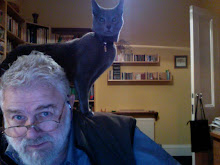There was a fracas some months ago - I think on the "Today" programme - about the new linguistic oddity of the double "is": as in "the thing is, is that", or "the problem is, is that" - and so forth.
They trotted out the customary "linguistic" "expert", who suggested that the second "is" is merely a lexical filler to enable the speaker to gather his ("or -yawn - her", to quote Giles Coren ) thoughts. This is demonstrably nonsense.
When speakers use the double "is", there's never a trace of hesitation. All that has happened is (is) that among careless speakers - who are the majority, and, therefore, in charge - such expressions have become cliches to such a degree that, for example, "the thing is" has become a composite word, necessitating another "is" for the sake of syntax.
The fact that I find this horrifying is not of the least importance: if it is the way that the language is going - why, then! - it is the way that the language is going. I wish it a happy and productive journey.
But I find myself uncomfortably suspended between two stools. A language that does not evolve is a dead language. (Maybe that's why I love Latin.) But it is possible for English to "make sense" without disrupting entirely the customs of usage and idiom. If the double "is" has become idiomatic, it saddens me: it doesn't make sense.





I'm puzzled. The post is headed "Brian Duncan writes:" and bears his photo, but has "Posted by David Crosbie" at the end.
ReplyDeleteAttila
ReplyDeleteThis is how the portal Blogger works. Brian can't post an OP but I can. There are two ways to send a text to me for posting:
1. publicly via the Welcome to Word-of-Mouthers thread
2. privately as a 'follower' — which allows us to email each other (I'm one of my own 'followers')
The words are Brian's own. I added nothing, apart from his photo, which the Blogger portal (as used by Brian) makes possible.
I added nothing, apart from his photo
ReplyDeleteNot quite true. I also added the headline Brian Duncan writes:
THis morning on R4, the President of the United States of America used the double "is" at least three times. He can scarcely be described as a "careless speaker". This must mean that such expressions as "thingis", "problemis" and so on are now English nouns. Well - as the sainted Frank used to say - there you go!
ReplyDeleteBrian
ReplyDeleteI have, I believe, an answer to your main points. Unfortunately, it came to me when I was in the middle of posting on this other Board (click).
To summarise:
1. is functions as as a copula — something not expressed by a word in many languages, including Russian and Arabic.
2. It's a mere equals sign, a signal dividing the TOPIC from the COMMENT.
3. When added to the TOPIC, it doesn't contains enough meaning to disturb the ear. A hearer doesn't detect an ungrammatical SUBJECT. For a reader it would be another matter.
4. Including an unnecessary — and, indeed, ungrammatical — copula to the TOPIC really is the result of slowing down to plan the wording. However it's unconscious planning, and the slowdown is in an extremely rapid mental process — far, far too rapid to be open to conscious monitoring.
Fair enough. But why, therefore, have we started doing it only recently?
ReplyDeleteMy guess is that we haven't started recently. It's such a natural process that I suspect people have been doing it sporadically for a long while.
ReplyDeleteWhat seems to have happened recently is that instead of hearing and ignoring it, an increasing number of people are hearing and (unconsciously) copying it. Like all fashions, the more it's displayed, the more it's copied.
That leaves only the question as to why the first few speakers copied is is and thus set the snowball rolling. I don't see anything wrong with the answer 'chance'. That's how flocks of birds in flight change direction, and that's how spontaneous fashions start.